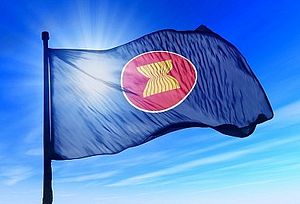On November 22, Malaysia hosted the 10th East Asia Summit (EAS) as part of the recent round of Asian summitry held in Kuala Lumpur.
The EAS, which comprises the ten members of the Association of Southeast Asian Nations (ASEAN) along with Australia, China, India, Japan, New Zealand, South Korea, Russia, and the United States, is considered the premier forum for leaders to discuss strategic issues.
This year’s EAS was especially significant, since it marks a decade since the first iteration of the meeting was held in Malaysia back in 2005. It was also held amid other important events in ASEAN and related meetings, including the establishment of an ASEAN Community and the signing of the U.S.-ASEAN strategic partnership (See: “ASEAN Creates New Community Under Malaysia’s Chairmanship“).
Ahead of this year’s EAS, several countries, including the United States, have been pushing for the strengthening of the EAS as a forum to not only tackle major regional issues, but also ongoing global crises and matters of concern (See: “Malaysia as ASEAN Chair in 2015: What To Expect”). In that vein, the Kuala Lumpur Declaration on the Tenth Anniversary of the EAS was adopted, with the chairman’s statement noting the substantive discussions that have occurred on the strengthening of the EAS in 2014 and 2015.
“In this, we are convinced that a stronger EAS will further contribute to peace and security in the region,” Malaysian Prime Minister Najib Razak said when chairing the meeting, according to national news agency Bernama.
Apart from that agenda item, the meeting also saw the official extension of the plan of action (POA) to implement the Phnom Penh Declaration on the East Asia Summit Development Initiative until the end of 2017. The POA aims to enhance EAS cooperation in six priority areas: energy; education, finance; global health; environment and disaster management; and ASEAN connectivity.
Several developments are occurring as cooperation is furthered within these six fields. For instance, leaders endorsed the Asia-Pacific Leaders Malaria Elimination Roadmap and its six priority areas as a way to realize their commitment to the goal of an Asia-Pacific free of malaria by 2030. They will also review the EAS Education Cooperation Plan of Action to develop a post-2015 vision and action plan.
Beyond that, this year’s EAS also addressed a range of regional and global issues, a few of which are worth highlighting. Among these, given the rising threat from the Islamic State and the recent attacks in Paris, there is little surprise that terrorism and moderation took center stage. Two outcomes were issued on this subject: the EAS Statement on Countering Violent Extremism and the EAS Declaration on the Global Movement of Moderates.
The EAS Statement condemned the terrorist attacks in Paris as well as in other cities, with the countries also pledging to undertake various actions including information-sharing, developing counter-narratives, empowering youth, and promoting interfaith dialogue. The EAS Declaration was a reference to the Global Movement of Moderates (GMM), which Najib had promoted in a speech to the United Nations back in 2010. Both outcomes unsurprisingly heavily emphasized Malaysia’s use of countering narratives and promoting moderation in the fight against the Islamic State. As I have noted previously, Malaysia has looked to play a leading role in global efforts against the threat, even agreeing to hosting a regional counter-messaging center (See: “Exclusive: US, Malaysia and the War Against the Islamic State”).
Maritime cooperation also featured prominently, which is hardly surprising considering the attention paid to the maritime domain in recent years, most visibly the South China Sea disputes. Indonesia in particular has had significant interest in this area, which is in line with President Joko “Jokowi” Widodo’s vision of Indonesia as a global maritime fulcrum between the Pacific and Indian Oceans. Jakarta has been pushing for greater cooperation including through the 4th Expanded ASEAN Maritime Forum and the 6th ASEAN Maritime Forum, which were both held in Manado, Indonesia in September this year (See: “Indonesia’s Maritime Ambition: Can Jokowi Realize It?”).
At the meeting, in addition to adopting the EAS Statement on Enhancing Regional Maritime Cooperation, officials were tasked with exploring the possibility of including maritime cooperation as an additional priority area for the EAS. The attention given to maritime cooperation was seen as a boost for Indonesia. Jokowi himself took note of the importance of the EAS Statement in a press release, stressing that the political declaration would require concrete follow up, including sustainable maritime economic development, connectivity, and cooperation among research institutes.
Security of and in the use of information and communication technologies (ICT) was another issue highlighted at this year’s EAS amid rising concerns about cybersecurity. EAS members pledged to cooperate to improve regional stability and reduce risk in this area by strengthening collaboration in areas such as information-sharing, capacity-building and incident response. They also adopted the EAS Statement on Issues Related to Security of and in the Use of ICTs.
The South China Sea also got its fair share of attention, which was expected since Malaysia is a claimant state (See: “Malaysia’s South China Sea Policy: Playing it Safe”). Five of the 31 paragraphs in the entire chairman’s statement were devoted to the issue, compared to the single paragraph allotted for other regional and international issues — a reflection of just how significant the South China Sea issue has become. The language for the most part was fairly boilerplate, noting the importance of peace, stability and freedom of navigation and overflight, serious concerns about ongoing developments, and the urgent need to conclude a binding code of conduct (COC). But interestingly, one of the paragraphs referenced assurances given by Chinese president Xi Jinping during his recent visit to Washington about not pursuing militarization in the South China Sea. Washington and its partners have repeatedly mentioned Xi’s pledge in a bid to hold China to its word.
The next EAS will be held in Laos in line with its holding of the rotating ASEAN chair next year.

































